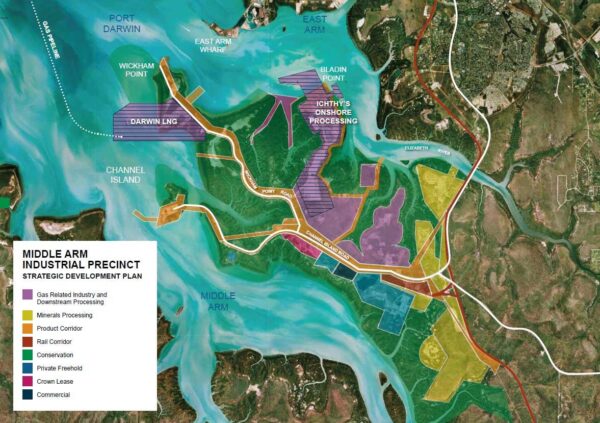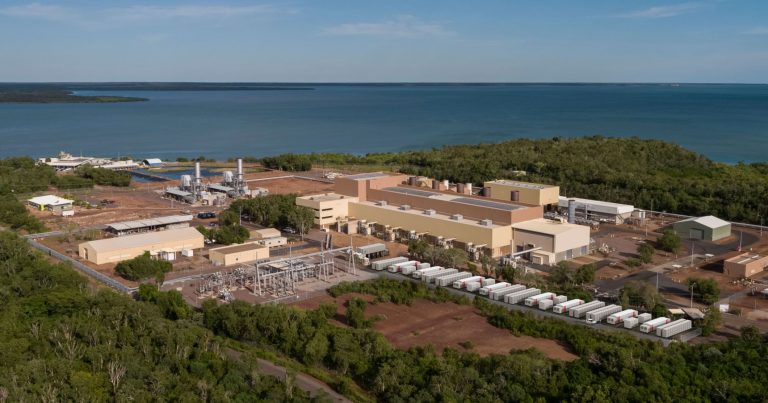As part of a $26.4 million budget spend on new and existing renewable energy initiatives, the Northern Territory (NT) government will invest $12 million to undertake planning and headworks to develop the Middle Arm Sustainable Development Precinct proposed for Darwin Harbour.
The NT government said the hub, planned for a 1,500-hectare site at Middle Arm, will support its renewable energy target of 50% by 2030 “by investing in large-scale renewable solar farms to deliver clean and affordable power to Territorians.”
NT Chief Minister Natasha Fyles said the proposed hub is part of the Darwin-Katherine electricity system plan which has been developed to assist in the transformation of the Territory’s power system.
“We want Territorians to have access to the latest and best technology as we build a stronger and more resilient power system for Territory households and businesses,” she said. “In Budget 2023 the NT government will continue to implement plans and strategies to support the achievement of the renewable energy target and improve the delivery of electricity services to consumers.”
Fyles said under the Darwin-Katherine electricity system plan, more large- and small-scale solar, increased battery energy storage use and new “hydrogen-compatible” gas generators will help lift the proportion of renewable energy in the NT’s largest power grid with the target of 50% renewable energy by the end of the decade, and towards zero net emissions by 2050.
The plan also includes the development of the Middle Arm Sustainable Development Precinct near the existing transmission infrastructure at Channel Island in Darwin Harbour.
Middle Arm is already home to a liquefied natural gas (LNG) export hub, and the Territory government is pushing ahead with construction of a 35 MW/35 MWh battery at the site. The Darwin-Katherine Battery Energy Storage System is expected to be operational later this year.

Image: NT government
It is envisaged the new precinct will centralise the Territory’s export and energy industries with a focus on low-emissions manufacturing and related eco systems including renewable energy, carbon capture and storage, minerals processing, and green hydrogen production.
“The industrial precinct will be largely powered by renewables, master-planned to achieve a circular economy approach of sustainable and responsible production and will use technology to achieve low-to-zero emissions,” the government said. “This is a sustainable future project that is based on renewable energy into the future.”
The funding injection for the Middle Arm Sustainable Development Precinct is part of a $26.4 million renewable energy package outlined by Fyles when she released the budget earlier this week.
Other energy initiatives include $5.4 million earmarked to progress electricity market reforms and achieve the government’s renewables target while $1.7 million has been allocated in the budget to collect wind resource data.
The Territory’s $7.3 million Remote Power Program will continue with the government to advance the delivery of renewable energy solutions in remote communities, with solar systems, batteries and green hydrogen set to replace diesel generators in communities across the territory.
The NT government said the commitment has already resulted in a framework to deliver renewable energy systems, including solar systems, batteries and green hydrogen to replace diesel generators in 73 communities.
The budget also includes funding to ensure the government’s Home and Business Battery Scheme will continue in 2023-24.
The scheme offers grants of $6,000 to homeowners, businesses and not-for-profit organisations to buy and install solar systems with an eligible battery and inverter or complement an existing solar system with a battery and inverter. The scheme was launched in 2020 with a modest target to support 133 battery installations, but to date has resulted in more than 1,600 batteries being installed across the Territory.
The government has also allocated funding for government-owned electricity retailer Jacana Energy to implement a trial of rooftop solar on 30 public housing tenancies in Darwin, Palmerston and Tennant Creek.
This content is protected by copyright and may not be reused. If you want to cooperate with us and would like to reuse some of our content, please contact: editors@pv-magazine.com.









By submitting this form you agree to pv magazine using your data for the purposes of publishing your comment.
Your personal data will only be disclosed or otherwise transmitted to third parties for the purposes of spam filtering or if this is necessary for technical maintenance of the website. Any other transfer to third parties will not take place unless this is justified on the basis of applicable data protection regulations or if pv magazine is legally obliged to do so.
You may revoke this consent at any time with effect for the future, in which case your personal data will be deleted immediately. Otherwise, your data will be deleted if pv magazine has processed your request or the purpose of data storage is fulfilled.
Further information on data privacy can be found in our Data Protection Policy.